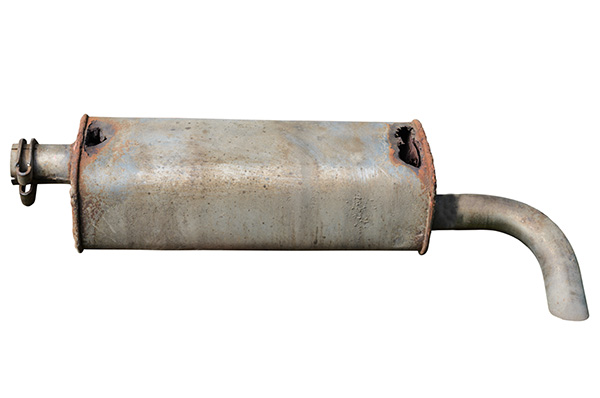
If you’ve noticed rust forming on your exhaust pipes or muffler, you may be wondering whether it’s something to fix or just ignore for now. While surface rust is often harmless, corrosion on the exhaust system can eventually affect performance, noise levels, and even safety. Deciding whether to repair or replace the affected parts depends on how severe the damage is and how long you plan to keep your vehicle.
Here’s what to consider when dealing with exhaust corrosion and how to tell when a replacement is the better option.
Why Exhaust Systems Rust Over Time
The exhaust system is constantly exposed to heat, moisture, and road contaminants. Water vapor naturally forms inside the pipes as a byproduct of combustion. When that moisture lingers, especially on short drives where the exhaust never gets hot enough to burn it off, it starts to corrode the metal.
In colder climates or near the coast, rust can develop faster due to salted roads or salty air. Older vehicles are also more prone to corrosion because of years of exposure and aging materials.
Spotting Early Signs of Exhaust Corrosion
At first, you might only notice a few orange or brown spots on the exhaust pipes or muffler. This is usually surface rust and not an immediate concern. However, if the rust starts to flake, bubble, or form holes, it may be a sign of more serious damage.
Other warning signs include:
- A louder exhaust note than usual
- Rattling or clunking sounds under the car
- Strong exhaust smell near the cabin
- Decreased fuel efficiency
If you’re noticing any of these, it’s time for a closer inspection.
When Repair Might Be Enough
Minor rust or small holes can often be repaired without replacing the entire exhaust system. If the rest of the pipe is still structurally sound, a technician might patch the hole, weld a new section in, or apply a high-temperature sealant to slow further corrosion.
Repair is usually the best choice if:
- The damage is isolated to one small area
- You want a quick and budget-friendly fix
- You’re planning to replace the vehicle soon
Just keep in mind that patch jobs are usually temporary. If corrosion is widespread or affecting multiple areas, repair may only delay the inevitable.
When It’s Better to Replace Corroded Parts
If rust has caused large holes, weakened the structure of the pipes, or affected critical components like the catalytic converter or muffler, replacement is the safer option. Driving with a severely corroded exhaust system can result in poor engine performance, higher emissions, and increased noise.
Replacement is often recommended when:
- The corrosion affects more than one part of the exhaust
- Welds or supports have broken due to rust
- The muffler or catalytic converter is compromised
- There’s a risk of exhaust leaks entering the cabin
Exhaust leaks can allow carbon monoxide to enter your vehicle, which is a serious health risk. In these cases, replacing the affected parts is the only safe option.
How Technicians Diagnose the Problem
A proper inspection involves lifting the vehicle and visually checking the entire exhaust system, including the manifold, catalytic converter, pipes, hangers, and muffler. Technicians look for rust, leaks, damaged welds, and any signs of movement in the system.
If the car is making unusual sounds or emitting strong odors, a technician may perform a smoke test or pressure test to find hidden leaks. They will then determine if repairs are possible or if a full or partial replacement is needed.
Choosing the Right Replacement Parts
If you do need to replace part of your exhaust system, the type of replacement matters. Stainless steel exhaust parts offer better corrosion resistance than traditional steel and often last longer, although they can be more expensive. Aluminized steel is a common choice that offers a balance between price and durability.
In many cases, replacing only the damaged section is enough, but if your vehicle is older and the entire system is showing signs of wear, replacing the full exhaust may be the smarter long-term choice.
Preventing Future Rust and Corrosion
To keep your new or repaired exhaust system in good shape, there are a few things you can do:
- Drive your car long enough for the exhaust to heat up fully, which helps burn off moisture
- Rinse the undercarriage after driving on salted roads or near the beach
- Have your vehicle inspected regularly, especially before winter
- Consider applying an undercoating or rust-preventive treatment to the exhaust and underbody
Prevention can go a long way in avoiding future repairs and keeping your vehicle running quietly and efficiently.
Exhaust Repairs You Can Trust at Griffin Muffler & Brake Center in Fort Madison, IA
If you're dealing with rusted or damaged exhaust parts, our technicians at Griffin Muffler & Brake Center in Fort Madison, IA, can help you decide the best course of action. Whether it's a minor repair or a full replacement, we’ll give your vehicle a thorough inspection and make sure your exhaust system is safe, reliable, and running quietly.
Schedule your visit today and let us keep your vehicle in peak condition.